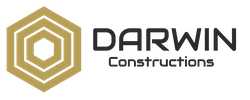Introduction
This Modern Slavery and Human Trafficking Statement is a response to Section 54(1), Part 6 of the Modern Slavery Act 2015 and relates to actions and activities for the financial year ending 01 April 2021.
Darwin Constructions is committed to preventing slavery and human trafficking violations in its own operations, its supply chain, and its products. We have zero-tolerance towards slavery and require our supply chain to comply with our values.
Organisational structure
Darwin Constructions has business operations in the United Kingdom.
We operate in the construction sector. The nature of our supply chains is as follows: Designers, builders, electricians, plumbers and general construction related services via contractors.
Policies
We operate a number of internal policies to ensure that we are conducting business in an ethical and transparent manner.
These include the following:
- Recruitment and selection policy– We conduct checks on all prospective employees to verify that they are eligible to work in the UK. Certain roles require a Disclosure and Barring Service (DBS) check where employees may be working with vulnerable people
- Supplier code of conduct– We operate this policy to ensure our suppliers operate in full compliance with the laws, rules and regulations of the countries in which they operate, and to seek similar commitments across their own supply chain
- Whistleblowing policy– We operate this policy so that employees are able to raise concerns about how staff are being treated or practices within our business or our supply chains without fear of reprisal
- Staff code of conduct– We are committed to the fair treatment of all staff. Our staff code of conduct reflects our core values and expected behaviours. The code of conduct makes it clear that we have a zero-tolerance approach to modern slavery
- Procurement policy– We want to make sure that potential suppliers are committed to ensuring that slavery and human trafficking is not taking place within their own supply chains. Our procurement policy and supporting procedures set out controls and checks undertaken to help verify this.
- Safeguarding policy– This policy highlights the potential risks of modern slavery and human trafficking, including how to identify signs of exploitation and how to report concerns.
We make sure our suppliers are aware of our policies and adhere to the same standards.
Due Diligence
As part of our efforts to monitor and reduce the risk of slavery and human trafficking occurring in our supply chains, we have adopted the following due diligence procedures:
- External supplier audits.
- Checking certain suppliers with external third parties for any slavery or human trafficking risks.
Our due diligence procedures aim to:
- Identify and action potential risks in our business and supply chains.
- Monitor potential risks in our business and supply chains
- Reduce the risk of slavery and human trafficking occurring in our business and supply chains.
- Provide protection for whistleblowers.
Risk and compliance
Darwin Constructions has evaluated the nature and extent of its exposure to the risk of slavery and human trafficking occurring in its UK supply chain through:
- Evaluating the slavery and human trafficking risks of each new supplier.
- Reviewing on a regular basis all aspects of the supply chain based on supply chain mapping.
We do not consider that we operate in a high-risk environment because The construction industry does have history and evidence of payment delays through supply chains and their contractors, in some cases this results in no payment, however at Darwin Constructions we have determined this low risk as we operate with UK suppliers only and have ensured our procurement methods are robust to ensure payment and rewards are received through the whole chain with any project we undertake, we conduct audits as part of this process to confirm suppliers and contractors have received payment as part of our Governance within project reporting to prevent slavery in any form.
We do not tolerate slavery and human trafficking in our supply chains. Where there is evidence of failure to comply with our policies and procedures by any of our suppliers, we will seek to terminate our relationship with that supplier immediately.
Effectiveness
We use Key Performance Indicators (KPIs) to measure its effectiveness and ensure that slavery and human trafficking is not taking place in its business and supply chains. These KPIs are as follows:
- We will contact suppliers to enquire about their modern slavery practices every12 months.
- We will train our staff about modern slavery issues and increase awareness within the business.
- We will carry out a regular audit of suppliers – 70% of suppliers each year.
Training our staff
We require our staff to complete training and ongoing refresher courses on slavery and human trafficking. Our training covers:
- How to identify the signs of slavery and human trafficking.
- What initial steps should be taken if slavery or human trafficking is suspected.
- How to escalate potential slavery or human trafficking issues to the relevant parties within the business.
- What external help is available.
- What steps the business should take if suppliers in its supply chain do not implement anti-slavery policies in high-risk scenarios, including their removal from the business’ supply chain.
Next steps
In the next financial year, we intend to take the following steps to tackle slavery and human trafficking by:
- These steps are intended to be taken by the business in its next financial year. For example, introducing new policies and procedures or organising wider training for the internal team working on modern slavery and human trafficking issues.
The statement was approved by the board of directors.
_______________________________________
Name: Darwin Ramlal
Role: MD
Date: 16/11/2021
Signature: R Ramlal
Next Review: 16/11/2022
Version: 1.0
